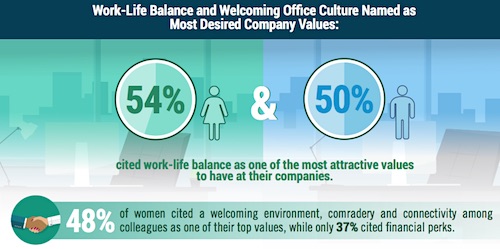 |
Work-life balance and a welcoming corporate culture are increasingly being seen as key factors in strengthening worker satisfaction and retaining employees over the long term, according to research released March 28 by FTI Consulting and women’s leadership firm Mine The Gap.
The report, Culture at Work, asked 4,764 women and 1,030 men employed in the financial, legal, energy and healthcare industries to say what they thought were the features that made a company a desirable place to work.
Work-life balance was at the top of list for both men and women, with 54 percent of female respondents and 50 percent of male respondents saying it was one of the top two features that made a company attractive. The second-most desired value (45 percent of women, 40 percent of men) was a corporate culture in which camaraderie and connectivity were a priority. Financial perks, inclusivity and innovation all lagged behind as contributors to a positive work environment.
The study also looked at the qualities that make for a negative work environment and result in employees, especially female employees, looking for the exits.
“Feeling undervalued” was the top reason women cited for leaving a workplace. About 62 percent of female respondents said that either they personally felt undervalued by their manager, or they had witnessed others being undervalued.

In addition, nearly half of female respondents said they had experienced such discriminatory behaviors as ineffective feedback from managers, being paid less than industry counterparts, being passed over for promotions despite meeting all of the criteria and being expected to be the note taker during a meeting—or even to clean up after office functions.
However, both men (80 percent) and women (82 percent) said they support a culture of respect and accountability in the workplace. There is also general agreement on the need for a company’s actions to line up with its stated values.
Most respondents also believe that changing workplace culture for the better is an attainable goal, with 55 percent of women and 61 percent of men saying they think they can change the culture at their workplace.
“Our research belies a common myth that women leave their jobs solely due to family demands,” said Elizabeth Alexander, a senior managing director in the strategic communications segment at FTI. “Instead, the data demonstrates that the reasons for employee departures are much more nuanced. To remain competitive and viable in today’s market, companies should carefully study their own workplace cultures.”


 Consumers who once demanded convenience now require consistent, multi-channel experiences that cater to them at every point. Brands must have a clear, audience-appropriate, and channel-specific voice across all platforms.
Consumers who once demanded convenience now require consistent, multi-channel experiences that cater to them at every point. Brands must have a clear, audience-appropriate, and channel-specific voice across all platforms. Employees at U.S. companies are experiencing high levels of burnout, but managers are lagging behind when it comes to their awareness of the problem
Employees at U.S. companies are experiencing high levels of burnout, but managers are lagging behind when it comes to their awareness of the problem Brand has a powerful effect on a company’s valuation, but the level of brand understanding in the investment community leaves a lot to be desired, according to a new study from Brodeur Partners, Interbrand and NewtonX.
Brand has a powerful effect on a company’s valuation, but the level of brand understanding in the investment community leaves a lot to be desired, according to a new study from Brodeur Partners, Interbrand and NewtonX. AI may still be viewed with a wary eye by most media pros, but its use is growing, according to a new study from Muck Rack.
AI may still be viewed with a wary eye by most media pros, but its use is growing, according to a new study from Muck Rack. A new study from Walker Sands says that some marketers have been putting the cart before the horse when it comes to the relationship between marketing channels and business outcomes.
A new study from Walker Sands says that some marketers have been putting the cart before the horse when it comes to the relationship between marketing channels and business outcomes.


 Have a comment? Send it to
Have a comment? Send it to 
No comments have been submitted for this story yet.